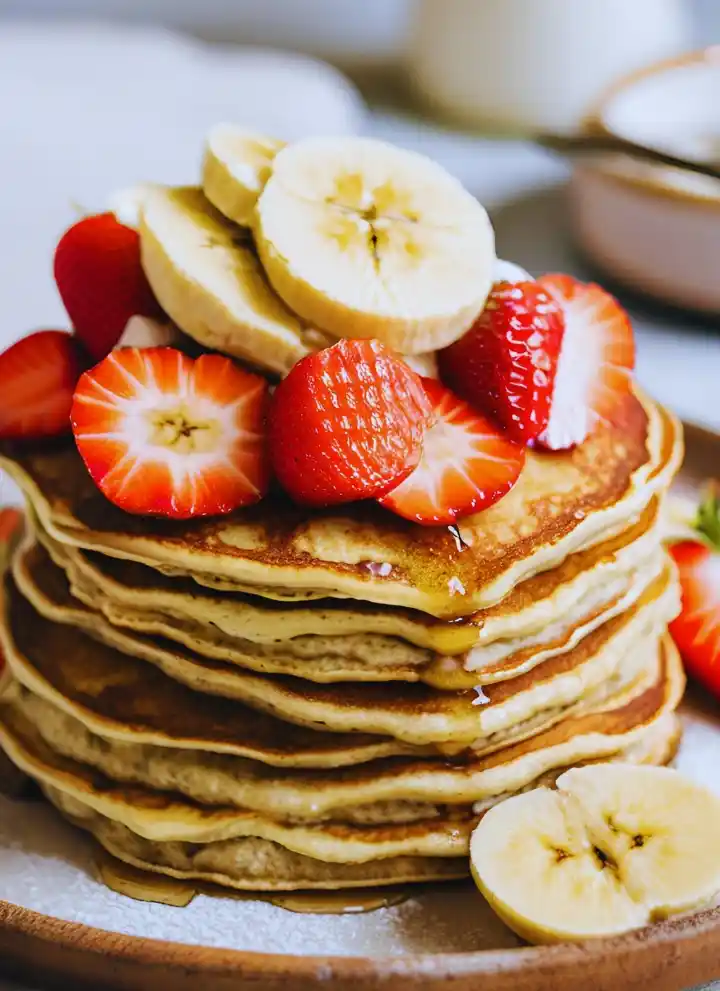1. Understanding Pancakes: A Breakfast Staple
Banana pancakes vs regular pancakes — this classic breakfast debate continues to grow in popularity as more people seek healthier morning options. Banana pancakes have gained traction for their natural sweetness and higher fiber content, but are they truly the better choice?
Pancakes, a beloved breakfast staple for centuries, originated in ancient Greece and Rome with simple recipes using flour, milk, and eggs.
Over the years, regional adaptations and health trends gave rise to variations like banana pancakes. In the evolving conversation of banana pancakes vs regular pancakes, each type brings unique nutritional benefits and flavor profiles to the table.
From the syrup-soaked stacks of North America to thin crepes in France and savory dosas in India, pancakes remain a versatile dish. But with growing nutritional awareness, many now question if regular pancakes—with refined flour and added sugars—are the healthiest option compared to banana pancakes.
2. What Are Banana Pancakes?
Banana pancakes have emerged as a health-conscious alternative to traditional pancakes. When discussing banana pancakes vs regular pancakes, the key difference lies in the ingredients:
Key Ingredients in Banana Pancakes: Ripe bananas, eggs, and oats or almond flour.
Key Ingredients in Regular Pancakes: All-purpose flour, sugar, butter, milk, and eggs.
Banana pancakes often exclude refined sugar and flour, replacing these with naturally sweet and fibrous bananas. They can also be easily adapted to gluten-free, dairy-free, or vegan diets, making them a versatile option for diverse dietary needs.
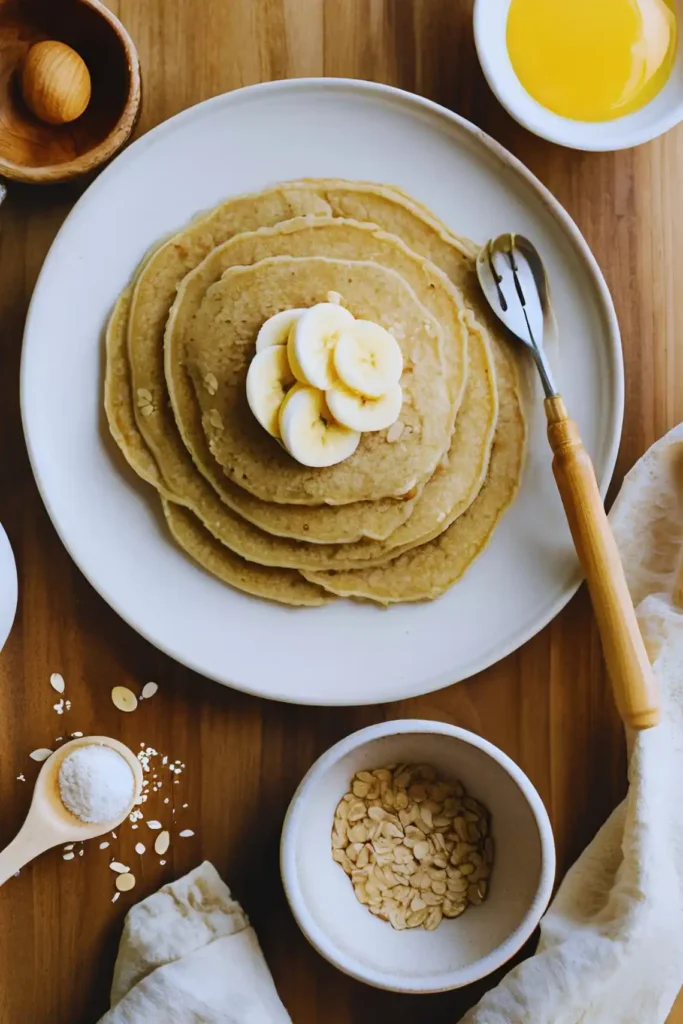
For more on banana-inspired breakfast recipes, check out this comprehensive guide to banana waffles.
3. Nutritional Profile of Pancakes
The nutritional makeup of pancakes varies significantly depending on the recipe. In comparing banana pancakes vs regular pancakes, the differences in calories, fiber, and micronutrients become clear:
Regular Pancakes: Typically high in refined carbs and low in fiber. A standard serving (2–3 pancakes) provides:
- ~200–300 calories
- ~40g carbohydrates (mostly refined)
- ~5–10g sugar (added sugars)
- Minimal fiber and micronutrients.
Banana Pancakes: Often viewed as nutrient-dense, a serving offers:
- ~150–200 calories
- ~30g carbohydrates (natural sugars from bananas)
- Higher fiber content (~3–5g)
- Rich in potassium, vitamin C, and other micronutrients.
By swapping processed ingredients for natural alternatives, banana pancakes cater to health-conscious eaters.
4. Defining Health in the Context of Pancakes
When evaluating banana pancakes vs regular pancakes in terms of health benefits, it’s crucial to define what “healthy” truly means. Health isn’t just about cutting calories; it’s about balancing:
- Calorie Intake vs. Nutritional Benefits: A food may be calorie-dense but nutrient-rich (e.g., bananas provide energy and essential vitamins).
- Misconceptions About “Healthy Foods”: Many equate “low calorie” with healthy, but this ignores important factors like fiber, protein, and natural sugars.
Ultimately, choosing the right pancake depends on your dietary goals, whether that’s reducing sugar intake, managing weight, or increasing nutrient consumption.
5. Popularity of Banana Pancakes in Health-Conscious Circles
Banana pancakes have surged in popularity, particularly within fitness and health communities. Several factors contribute to this trend:
- Rise in Fitness Culture: Gym-goers and athletes praise banana pancakes for their natural sugars, protein, and potassium—key for muscle recovery.
- Social Media Influence: Platforms like Instagram and TikTok showcase easy banana pancake recipes, further fueling their appeal.
This widespread interest shows how the debate around banana pancakes vs regular pancakes reflects broader shifts toward healthier, more natural eating habits.
6. Caloric Content: Which Is Lower?
One of the most common questions when comparing banana pancakes to regular pancakes is about their caloric content. Here’s how they stack up:
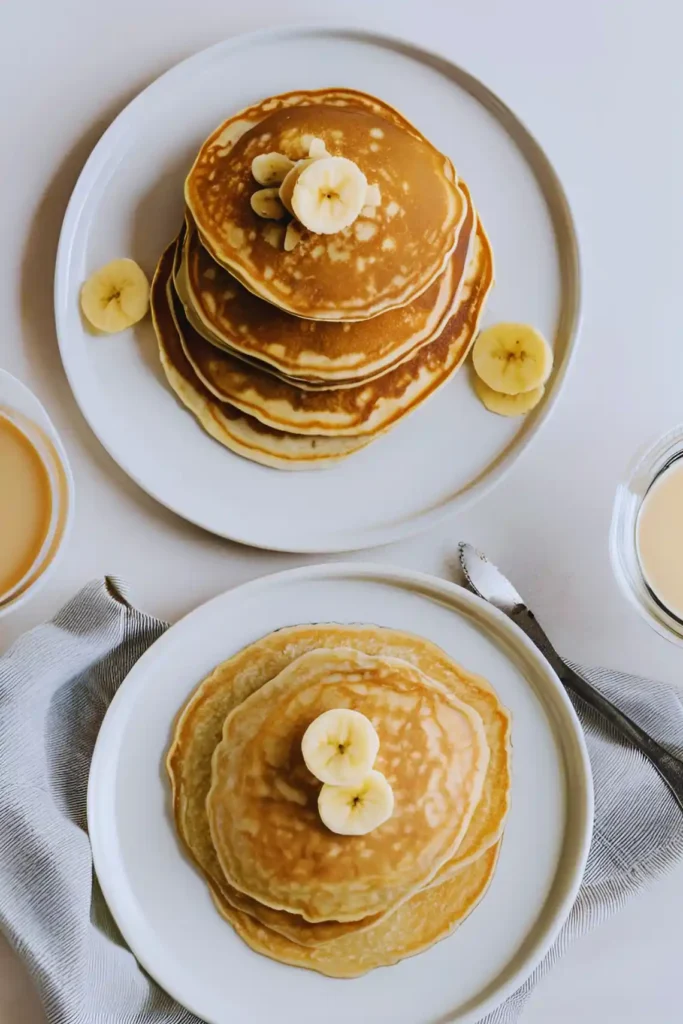
- Regular Pancakes: A serving of two medium pancakes with syrup can range from 250 to 400 calories. These calories primarily come from refined flour, sugar, butter, and syrup.
- Banana Pancakes: A serving of banana pancakes (made with bananas, eggs, and oats) typically contains 150 to 250 calories. The sweetness from ripe bananas often eliminates the need for syrup or sugar, reducing the overall calorie count.
Key Takeaway: If you’re watching calories, banana pancakes generally have a lower caloric load, especially when prepared without sugary toppings.
7. Carbohydrate and Sugar Content
Carbohydrates are a critical macronutrient in pancakes, but not all carbs are created equal.
- Regular Pancakes: The refined flour in regular pancakes provides simple carbohydrates, which can spike blood sugar levels. When paired with syrup, this further adds added sugars—around 10-20g per serving.
- Banana Pancakes: Bananas supply natural sugars, offering a gentler impact on blood sugar. Oats or almond flour contribute complex carbs, which are slower to digest and help maintain steady energy levels.
Impact on Blood Sugar: Banana pancakes are better suited for individuals aiming to avoid blood sugar spikes, such as those managing diabetes or insulin resistance.
8. Protein and Fiber Content
Protein and fiber are two factors that determine how filling and nutritious a meal is:
- Regular Pancakes:
- Protein: ~5g per serving (from milk and eggs).
- Fiber: Negligible, as refined flour lacks fiber.
- Banana Pancakes:
- Protein: ~6-10g per serving (thanks to eggs, oats, or almond flour).
- Fiber: ~3-5g, due to the presence of whole bananas and oats.
Benefits: The higher fiber content in banana pancakes supports digestion and promotes satiety. Adding nuts, seeds, or plant-based protein powder to the batter can further boost the protein content.
9. Fat Content and Sources
Fat plays a role in flavor and texture, but the source of fat is critical for health:
- Regular Pancakes: The butter or oil used in the batter adds saturated fats. Syrups and whipped toppings can increase the fat content further, often tipping into unhealthy territory.
- Banana Pancakes: These can be made with little to no added fat. When fats are included, they’re often healthier sources such as:
- Coconut oil
- Nut butters
- Avocado oil
10. Micronutrient Profile: Vitamins and Minerals
A notable advantage of banana pancakes is their abundance of micronutrients:
- Bananas: Rich in potassium, which supports heart health and muscle function. They also contain vitamin C and vitamin B6.
- Oats or Almond Flour: Add magnesium, zinc, and vitamin E.
Regular pancakes, on the other hand, lack these natural nutrients unless enriched or fortified. Their primary contribution is calories without significant micronutrient density.
Summary of Nutritional Differences
| Nutrient | Regular Pancakes | Banana Pancakes |
|---|---|---|
| Calories | 250-400 | 150-250 |
| Carbohydrates | High (simple carbs, added sugars) | Moderate (natural sugars, complex carbs) |
| Protein | 5g | 6-10g |
| Fiber | Low (negligible) | Moderate to High (~3-5g) |
| Fat | Saturated fats from butter/oil | Healthier fats from bananas/nuts |
| Micronutrients | Minimal | Rich in potassium, magnesium, vitamin C |
11. Digestion and Satiety: Which Keeps You Fuller?
Satiety, or the feeling of fullness, is crucial when comparing the health benefits of banana and regular pancakes.
- Regular Pancakes: Made from refined flour, they are low in fiber. This means they digest quickly, leading to a rapid spike in blood sugar levels followed by a crash. As a result, hunger may return sooner, making them less satisfying in the long term.
- Banana Pancakes: Contain natural fiber from bananas and oats, which slows digestion and helps maintain a steady release of energy. This can keep you feeling fuller for longer. Adding toppings like nut butter or chia seeds can further enhance their satiety.
Key Insight: For those looking to stay full until their next meal, banana pancakes are the better choice due to their high-fiber and nutrient-dense composition.
12. Allergen and Dietary Considerations
Banana pancakes are a versatile option for various dietary restrictions:
- Gluten-Free Diets: Traditional pancakes rely on wheat flour, making them unsuitable for those with gluten intolerance or celiac disease. Banana pancakes can easily be made with gluten-free alternatives like almond flour or oats.
- Dairy-Free Diets: Regular pancakes often include milk or butter, but banana pancakes can be made without any dairy products.
- Egg-Free Options: For vegans or those with egg allergies, banana pancakes can use flaxseed meal or aquafaba as a substitute for eggs.
Risks: While banana pancakes are adaptable, they may not be suitable for individuals allergic to bananas or nuts, depending on the recipe.
13. Glycemic Index: Banana Pancakes vs. Regular Pancakes
The glycemic index (GI) measures how quickly a food raises blood sugar levels. Foods with a lower GI are generally better for maintaining stable energy and managing conditions like diabetes.
- Regular Pancakes: With refined flour and added sugars, their GI tends to be high, leading to a quick sugar spike.
- Banana Pancakes: Bananas, especially when slightly underripe, have a moderate GI. Combined with oats or almond flour, this lowers the GI further, providing a slower, steadier energy release.
Why It Matters: Banana pancakes are a healthier option for individuals seeking to avoid blood sugar spikes and crashes.
14. Environmental and Ethical Factors
The environmental impact of our food choices is an increasingly important consideration:
- Bananas: As a plant-based ingredient, bananas have a smaller carbon footprint compared to the production and processing of refined flour and dairy. Additionally, bananas are biodegradable and often sold with minimal packaging.
- Flour and Dairy: The industrial farming practices involved in producing wheat and dairy contribute to deforestation, water usage, and greenhouse gas emissions.
Eco-Friendly Practices: Preparing banana pancakes with sustainably sourced ingredients (e.g., organic bananas, local eggs) can further reduce your environmental impact.
15. Cost and Accessibility
The cost and availability of ingredients may influence your choice:
- Banana Pancakes: Bananas are widely available and affordable, making banana pancakes accessible in most regions. Using oats or almond flour might increase the cost slightly but adds nutritional benefits.
- Regular Pancakes: Ingredients like flour, sugar, and butter are inexpensive and easy to source, making regular pancakes a budget-friendly option.
Consideration: While banana pancakes can cost slightly more depending on the ingredients used, their nutritional value makes them a worthwhile investment for health-conscious individuals.
16. Recipe Variations and Health Impacts
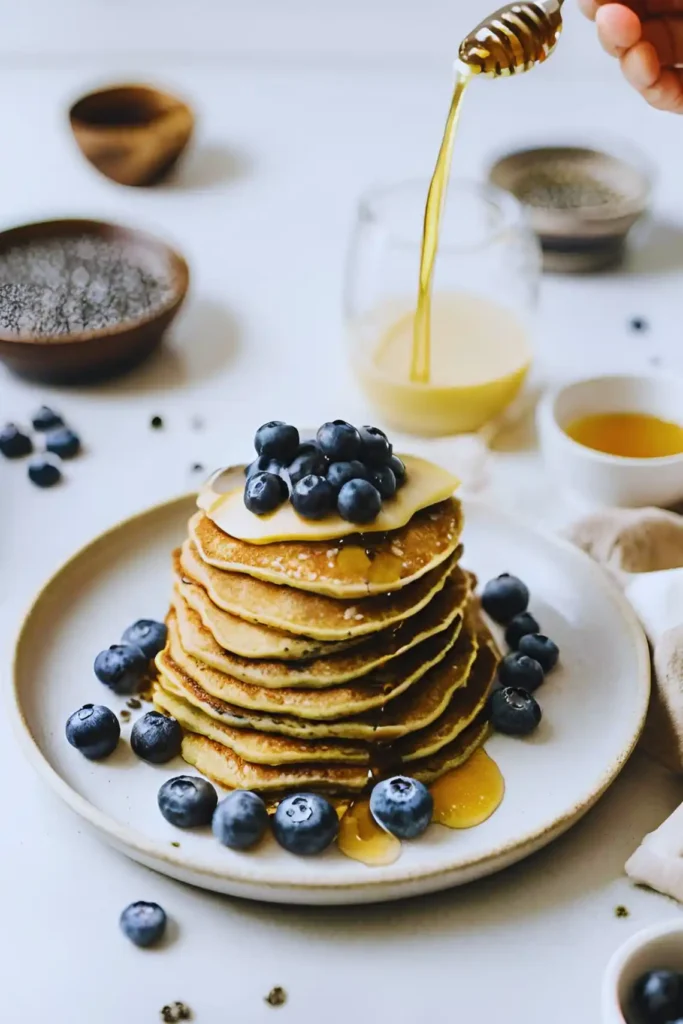
Banana pancakes offer endless customization opportunities to boost their health benefits:
- Substitute Flours: Use almond flour or coconut flour for added fiber and healthy fats.
- Add Seeds: Chia seeds, flaxseeds, or hemp hearts increase omega-3 fatty acids and protein.
- Include Superfoods: Incorporating ingredients like cacao powder or matcha boosts antioxidant content.
17. Consumer Preferences and Taste
Taste is subjective, and preferences vary:
- Regular Pancakes: Known for their light, fluffy texture, they pair well with a wide range of toppings like syrup, butter, or whipped cream. However, their reliance on refined ingredients can taste overly sweet or bland without toppings.
- Banana Pancakes: These are naturally sweet, with a slightly dense texture due to the bananas. They are flavorful on their own but can be enhanced with fruits, nuts, or honey for added variety.
Balance of Health and Flavor: For many, banana pancakes strike the perfect balance between taste and nutrition.
18. How to Make Banana Pancakes Even Healthier
Here are some tips to maximize the nutritional profile of banana pancakes:
- Add Protein: Mix in a scoop of plant-based or whey protein powder to support muscle recovery and growth.
- Reduce Sugar: Avoid adding sweeteners; ripe bananas provide sufficient natural sweetness.
- Use Non-Dairy Milk: Almond milk or oat milk is a great substitute for traditional milk.
- Incorporate Vegetables: Add grated zucchini or carrots for a hidden veggie boost.
19. Who Should Avoid Banana Pancakes?
While banana pancakes are a nutrient-dense option, they may not suit everyone:
- Banana Allergies: Individuals allergic to bananas should avoid them entirely.
- Low-Carb Dieters: Those following strict low-carb diets like keto may find the natural sugars in bananas too high.
- Athletes in Need of High Calories: For those requiring a higher calorie intake, regular pancakes with calorie-dense toppings might be a better fit.
20. Conclusion: Are Banana Pancakes Truly Healthier?
Banana pancakes are undoubtedly a healthier alternative to regular pancakes, offering more fiber, protein, and essential vitamins and minerals. They have a lower glycemic impact and are adaptable to various dietary restrictions, making them a versatile choice.
That said, the decision ultimately depends on individual goals and preferences. Moderation and balance remain key in any dietary choice. Whether you opt for banana pancakes or regular ones, focusing on nutrient-dense ingredients will help ensure a healthier breakfast.
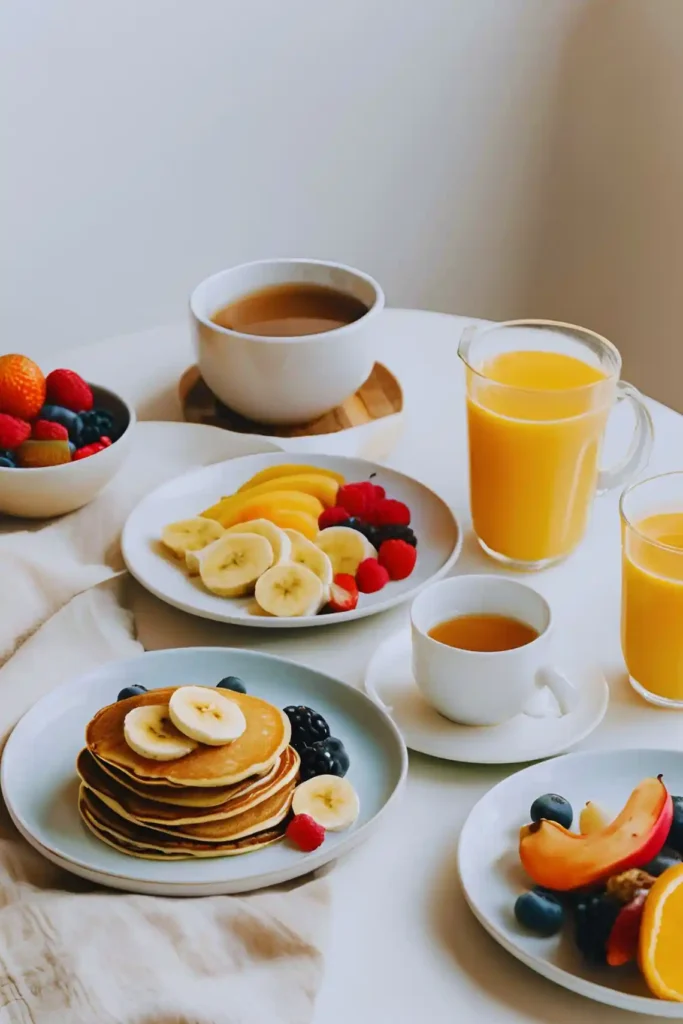
FAQs: Banana Pancakes vs Regular Pancakes
1. Are banana pancakes suitable for people with gluten intolerance?
Yes, banana pancakes can easily be made gluten-free by using ingredients like almond flour, oat flour, or coconut flour instead of wheat-based flour. Bananas naturally do not contain gluten, making them an excellent base for gluten-sensitive individuals. To ensure no cross-contamination, always choose certified gluten-free oats or other flour substitutes.
2. Do banana pancakes provide enough protein for a balanced meal?
Banana pancakes typically contain more protein than regular pancakes due to eggs and optional add-ins like almond flour or seeds. However, if you want to boost protein further, consider adding a scoop of protein powder, Greek yogurt, or a nut butter topping. This ensures your meal is both satisfying and nutrient-rich.
3. Can banana pancakes help with weight loss?
Banana pancakes can support weight loss when paired with a balanced diet, thanks to their lower calorie content and higher fiber compared to regular pancakes. The fiber helps with satiety, while the natural sweetness reduces the need for calorie-laden syrups. However, portion control and the choice of toppings are crucial for keeping them weight-loss friendly.

